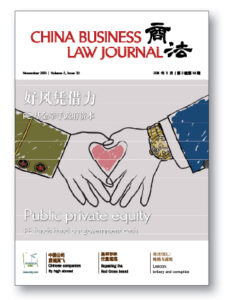Governments are going through lean times. Across the developed world, the state is retreating from the arts, science, social welfare and even education. People in power in Europe and North America are closing the public coffers while they attempt to repair their national balance sheets, or simply run out of cash.
Not so China. Leaders have openly debated whether the country might intervene to save the euro from the Europeans, by lending money to Greece, Ireland, Italy and others. China has, it could be said, more money than it knows what to do with.
Or perhaps it knows just what to do with it. In Public private equity, this issue of China Business Law Journal examines a peculiarly Chinese phenomenon which has recently appeared: central and local government investing public money in private equity funds, which reinvest it according to the government’s criteria of promoting new and high-technology industry. Our coverage asks and answers some key questions. How is this money invested? Into what kind of projects? With what strings attached? Who is charged with investing it? And, most importantly, who can get their hands on it, and will the government ever get it back?
If the venture capitalists entrusted with the people’s money invest it well and wisely, they might just catalyse China’s next phase of growth. If they don’t, five years from now the Chinese state at all levels will be writing off an awful lot of bad debt.
China’s current surfeit of cash also provides the background to our second story this month: a focus on outbound investment. In Flying high, our correspondent spoke in depth to the lawyers behind three recent outbound deals: China Aviation Industry General Aircraft’s purchase of a US manufacturer of executive jets; the acquisition by Bright Food Group of Manassen Foods of Australia; and the takeover of BorsodChem of Hungary by Wanhua Industrial Group. Each deal has its own features worthy of note, and offers food for thought to potential outbound and inbound investors alike.
Our third story this month is the first of a new section: Business Law Dialogue. We hope Business Law Dialogue will become a favoured forum in which corporate counsel and other key figures share their experience and insight. We won’t be afraid to ask difficult questions. Our first interviewee is Ding Shuo, who is also a member of this magazine’s editorial board. Having spent several years as a legal adviser for the Beijing Organizing Committee of the XXIXth Olympiad, he then moved to an in-house role at the Chinese Red Cross – an organization beset by scandal over the past year. We are grateful to him for sharing his thoughts with us frankly and openly.
It is by frank and open discussion that individuals and organizations will be tested and will grow stronger. We hope they may also develop an attribute that Ding himself requests from the public: that of tolerance while others learn and improve.






















